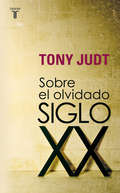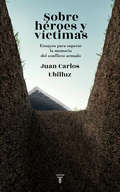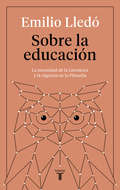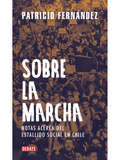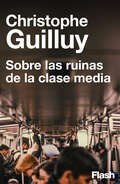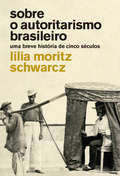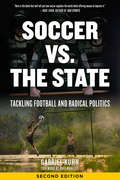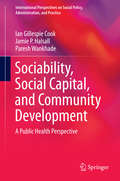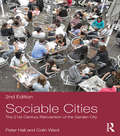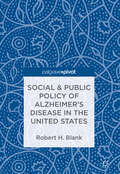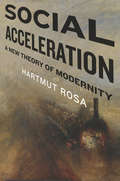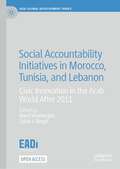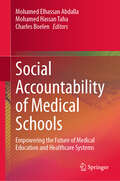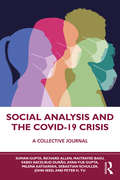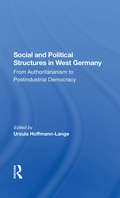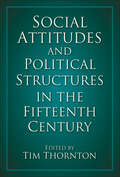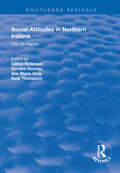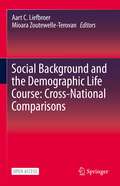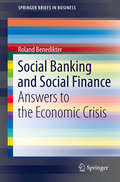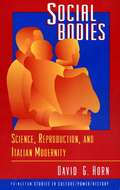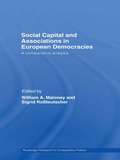- Table View
- List View
Sobre el olvidado siglo XX
by Tony JudtEl sentido de la Historia para construir el futuro. Tony Judt afirma que hemos entrado en una «época de olvido». Hoy, el mundo es tan radicalmente distinto del de hace tan sólo veinte años, que hemos dejado de lado nuestro pasado inmediato incluso antes de haber podido entenderlo. No sabemos, literalmente, de dónde venimos, y el resultado de esta ignorancia creciente ha demostrado ser nefasto e incluso tiende a ir a peor. Hemos perdido el contacto con tres generaciones de debate político internacional y pensamiento y activismo social. Ya no sabemos discutir sobre ese tipo de conceptos y hemos olvidado el papel que jugaban los intelectuales a la hora de debatir, transmitir y defender las ideas que conformaron su tiempo. En este libro, Tony Judt hace revivir aspectos clave del mundo que hemos perdido, y nos recuerda lo importantes que siguen siendo tanto para hoy como para lo que esperamos del futuro. Judt halla sugestivos vínculos entre una asombrosa variedad de temas, desde la historia del abandono y recuperación del Holocausto, o la difícil cuestión del «mal» en la comprensión del pasado europeo, hasta el auge y la caída del papel del Estado en los asuntos públicos o el arrinconamiento de la historia en favor de la «herencia». Nos lleva más allá de lo que creemos saber para enseñarnos cómo lo aprendimos, y muestra hasta qué punto gran parte de nuestra historia ha sido sacrificada ante el triunfo del mito frente a la comprensión, de la negación frente a la memoria. Este libro es la necesaria hoja de ruta para recuperar el sentido de la historia que necesitamos con tanta urgencia. La crítica ha dicho...«Sobre el olvidado siglo XX emprende una implacable disección de las ilusiones dominantes de los años de la postguerra. Un compendio, imprescindible para estos tiempos, de uno de los más grandes historiadores y politólogos de nuestra era.»John Gray, The Guardian «Judt es toda una autoridad, que aborrece el derramamiento de sangre pero disfruta con el combate verbal. Es el intelectual de los intelectuales.»Niall Ferguson, Financial Times «Judt nos recuerda que el pasado nunca desaparece por completo y que este siglo está tan sembrado de peligros como el anterior. Esta fascinante exploración del mundo que perdimos recientemente -para bien o para mal, o ambos-, es insuperable.»Publishers Weekly «Pocos son mejores que Tony Judt.»Geoffrey Wheatcroft, New York Times
Sobre héroes y víctimas: Ensayos para superar la memoria del conflicto armado
by JUAN CARLOS UBILLUZEnsayos sobre tres obras literarias que desmontan las bases afectivas y teóricas del giro ético La caída del muro Berlín produjo en muchos espíritus progresistas un giro de la política radical a la ética humanitaria. Los años de Sendero Luminoso afianzaron en el Perú esta operación, y el cambio de siglo estuvo marcado por el paso de la identificación heroica con la revolución a la creencia de que esta inevitablemente conduce al desastre, y que, por tanto, el progresismo debe limitarse a evitar el dolor de las víctimas. Sobre héroes y víctimas examina esta mutación en el sentir y pensar que rige el grueso de nuestras producciones artísticas, culturales y académicas en torno al conflicto armado. A partir del comentario crítico de Los rendidos de José Carlos Agüero, La sangre de la aurora de Claudia Salazar y Memorias de un soldado desconocido de Lurgio Gavilán, Juan Carlos Ubilluz desmonta las bases afectivas y teóricas del giro ético y señala cómo ellas fungen de posibles obstáculos a una futura política de emancipación. Pero Ubilluz da, además, un paso más allá de la crítica y busca un retorno de la ética a la política mediante una serie de Intervenciones donde se revalora el heroísmo y la utopía, se reclama un arte político que trascienda la denuncia y se señala algunos caminos para una izquierda realmente contemporánea.
Sobre la educación: La necesidad de la literatura y la vigencia de la filosofía
by Emilio LledóLa defensa a ultranza de una educación moderna y emancipadora, de enfoque humanista y con un papel clave reservado a la Filosofía. <P><P>Emilio Lledó, uno de los más relevantes pensadores españoles de nuestro tiempo, ha situado la educación en el centro de su filosofía, y el ideal pedagógico que defiende se alimenta, por supuesto, de unos sólidos cimientos filosóficos con especial atención en la filosofía griega clásica, al lenguaje y a la memoria, pero también de una larga experiencia en las aulas. <P>Lledó, a favor de una educación pública «que haga desaparecer las azarosas e injustas diferencias que necesariamente impone la sociedad», defiende también una organización moderna e interdisciplinaria -no asignaturesca- de los conocimientos, reflexiona sobre la identidad, la necesidad de cultivar el lenguaje, los peligros de la obsesión tecnológica, de la escuela y la universidad, y de la paulatina desaparición de las Humanidades. <P>«En la raíz de la palabra "educación" está un verbo latino que significa "guiar", "conducir"; pero también sacar algo de alguien: guiar, pues, y desarrollar lo que yace en el fondo originario de cada naturaleza que es dinamismo, posibilidad, evolución, progreso.»Emilio Lledó
Sobre la marcha: Notas acerca del estallido social chileno
by Patricio FernandezPatricio Fernández registra distintas escenas sobre lo acontecido en Chile luego del 18-O «A lo largo de estos cuatro meses el estallido ha sido fiesta, comunión, reflexión, barbarie, delincuencia y guerra», afirma Patricio Fernández al comienzo de Sobre la marcha, crónica en la que analiza con sagacidad el malestar social que se ha desatado en Chile y en varias partes del mundo en el último tiempo. Su registro, similar al de su libro La calle me distrajo, da cuenta de una nueva relación entre las élites y la ciudadanía, pero, sobre todo, de una nueva normalidad. Un ejercicio literario «escrito en medio de los acontecimientos que relata» y que, en base a lo que el autor observó y escuchó directamente en las calles, reflexiona sobre las consignas, la Primera Línea, la represión, las funas, los amarillos, los grafitis, entre otras escenas, voces y lugares, ofreciendo variadas posibilidades de comprensión sobre lo que ha ocurrido. ¿Su propósito? Para sentarse a conversar, asegura Fernández, «hay un mundo nuevo que requiere ser entendido antes que juzgado».
Sobre las ruinas de la clase media
by Christophe GuilluyUn ensayo imprescindible para entender la sociedad actual en su totalidad. Este ensayo, que forma parte de la obra No society (Taurus), muestra como la desaparición de la clase media está estrechamente relacionada con la globalización y el drástico crecimiento del populismo. Así pues, fenómenos como el Brexit o Trump no son fruto de la irracionalidad, sino una consecuencia directa del modelo económico y social que, desde la segunda mitad del siglo XX, ha estado acabando la clase media. Esta ha sido sustituida por el mundo de las periferias, que actualmente abarca a la gran mayoría de grupos de la sociedad: desde los jubilados a los estudiantes. «La suma de los márgenes acaba por formar un todo: la sociedad.»
Sobre o autoritarismo brasileiro: Uma breve história de cinco séculos
by Lilia M. SchwarczDe uma das historiadoras brasileiras mais influentes e premiadas da actualidade, Lilia Moritz Schwarcz, chega-nos uma viagem urgente e esclarecedora aos subterrâneos da história brasileira. Um dos 10 melhores e mais vendidos livros brasileiros de 2019 Tal como os portugueses, também os brasileiros gostam de se crer mais diversos, tolerantes, abertos, pacíficos e acolhedores do que aquilo que realmente são. Esta mitologia, que domina ambas as narrativas nacionais, tem consequências muito visíveis e diretas na história destes dois países tão umbilicalmente ligados. Ao longo de oito capítulos, Lilia Moritz Schwarcz, uma das mais conceituadas historiadoras do Brasil contemporâneo, explora temas tão determinantes quando fraturantes na história do Brasil: o racismo, a desigualdade social, a corrupção, a violência, a escravatura, a intolerância. Aqui seencontram algumas das raízes do autoritarismo brasileiro, na sua maioria originárias dos tempos coloniais e frequentemente mascaradas por uma mitologia nacional construída ad hoc e que obscurece uma realidade marcada pela lógica da dominação. Para a construção de uma sociedade mais justa e igualitária, no Brasil e no mundo, é urgente analisar e compreender as origens da desigualdade e do descontentamento, destrinçar a história de uma nação dos seus mitos fundadores e lançar a escada para a via da educação e da cidadania activa. «História não é bula de remédio nem produz efeitos rápidos de curta ou longa duração. Ajuda, porém, a tirar do véu do espanto e a produzir uma discussão mais crítica sobre nosso passado, nosso presente e sonho de futuro.» Da introdução de Sobre o autoritarismo brasileiro, breve história de cinco séculos
Sobrevivira Estados Unidos: Revelaciones sorprendentes y promesas de esperanza
by John HageeThis new book by New York Times bestselling author and pastor, John Hagee, says the United States is heading into a “Perfect Storm.” Titanic. John F. Kennedy’s assassination. 9/11. John Hagee maintains that these American tragedies all have one element in common: they were unthinkable. And in the opening pages of his newest book, Can America Survive? Hagee uses these tragedies to prove two points: that the unthinkable can happen and, given the right conditions, the unthinkable can quickly become the inevitable.In Can America Survive? Hagee asserts that the seeds for tragedy are once again being sown, evidenced by the disturbing economic, geopolitical, and religious trends that now threaten to dismantle the very nation itself. “Think it can’t happen?” Hagee asks in a theme repeated throughout the book. “Think again.” Indeed, Hagee presents alarming examples of recent events, current research, scientific evidence, and biblical prophecy that are gathering to create a “perfect storm” that could bring down the “unsinkable” United States of America. Can America Survive? is not just a warning. It is a wake-up call and a rallying cry to Christian citizens everywhere to prevent the next unthinkable American disaster. After all, as Hagee points out, “those who do not remember the mistakes of the past are doomed to repeat them in the future.” Think it can’t happen? Think again.
Soccer Chick Rules
by Dawn FitzgeraldWhile trying to focus on a winning soccer season, thirteen-year-old Tess becomes involved in local politics when she learns that all sports programs at her school will be stopped unless a tax levy is passed.
Soccer vs. the State: Tackling Football and Radical Politics
by Boff Whalley Gabriel KuhnSoccer has turned into a multi-billion-dollar industry. Professionalism and commercialization dominate its global image. Yet the game retains a rebellious side, maybe more so than any other sport co-opted by money makers and corrupt politicians. From its roots in working-class England to political protests by players and fans, and a current radical soccer underground, the notion of football as the “people’s game” has been kept alive by numerous individuals, teams, and communities. This book not only traces this history, but also reflects on common criticisms: soccer ferments nationalism, serves right-wing powers, and fosters competitiveness. Acknowledging these concerns, alternative perspectives on the game are explored, down to practical examples of egalitarian DIY soccer! Soccer vs. the State serves both as an orientation for the politically conscious football supporter and as an inspiration for those who try to pursue the love of the game away from televisions and big stadiums, bringing it to back alleys and muddy pastures. This second edition has been expanded to cover events of recent years, including the involvement of soccer fans in the Middle Eastern uprisings of 2011–2013, the FIFA scandal of 2015, and the 2017 strike by the Danish women’s team.
Sociability, Social Capital, and Community Development
by Ian Gillespie Cook Jamie P. Halsall Paresh WankhadeThis book provides a critical understanding of contemporary issues within global society and how these relate to six case study examples (UK, USA, China, India, South Africa, Bangladesh, and Japan). The authors draw on their diverse experience to explore four major themes of contemporary relevance: overall aging of societies; governance and institutions; emergency services and public health provisions; and community activism and involvement. The key issues within the book--sociability, social capital, and community development--are examined in the context of an ever increasing aging world. The authors' sense of optimism is linked to growing evidence that community activism is on the rise and can effectively plug the gap between public need and provision of service.
Sociable Cities: The 21st-Century Reinvention of the Garden City (Planning, History and Environment Series)
by Colin Ward Peter HallPeter Hall and Colin Ward wrote Sociable Cities to celebrate the centenary of publication of Ebenezer Howard’s To-morrow: A Peaceful Path to Real Reform in 1998 – an event they then marked by co-editing (with Dennis Hardy) the magnificent annotated facsimile edition of Howard’s original, long lost and very scarce, in 2003. In this revised edition of Sociable Cities, sadly now without Colin Ward, Peter Hall writes: ‘the sixteen years separating the two editions of this book seem almost like geological time. Revisiting the 1998 edition is like going back deep into ancient history’. The glad confident morning following Tony Blair’s election has been followed by political disillusionment, the fiscal crash, widespread austerity and a marked anti-planning stance on the part of the Coalition government. But – closely following the argument of Good Cities, Better Lives: How Europe discovered the Lost Art of Urbanism (Routledge 2013), to which this book is designed as a companion – Hall argues that the central message is now even stronger: we need more planning, not less. And this planning needs to be driven by broad, high-level strategic visions – national, regional – of the kind of country we want to see. Above all, Hall shows in the concluding chapters, Britain’s escalating housing crisis can be resolved only by a massive programme of planned decentralization from London, at least equal in scale to the great Abercrombie plan seventy years ago. He sets out a picture of great new city clusters at the periphery of South East England, sustainably self-sufficient in their daily patterns of living and working, but linked to the capital by new high-speed rail services. This is a book that every planner, and every serious student of policy-making, will want to read. Published at a time when the political parties are preparing their policy manifestos, it is designed to make a major contribution to a major national debate.
Social & Public Policy of Alzheimer's Disease in the United States
by Robert H. BlankThis book focuses on the public policy and political dimensions of Alzheimer’s Disease and other dementias (AD/D) in the United States, with coverage of the global dimensions and relevant examples from other countries. Starting off with a discussion on the characteristics of AD/D and competing theories of their causes, their human and financial costs, and the increasing burden they place on all societies as populations age, the book examines in detail the range of policy issues they raise. These include funding policies, payment policy and regulatory functions, long-term services and support (LTCS), public health and prevention policies.The book analyses the big business surrounding AD/D and shows that the strong public fear of developing dementia heightens the likelihood of exploitation of vulnerable people looking for a technological fix. It examines both informal and formal caregivers and the heavy burden placed on families, primarily women, and recent policy attempts to strengthen LTCS. It also examines the latest evidence of potential risk-reduction and prevention strategies and the difficult issues surrounding advance directives, assisted suicide, and definitions of death that increasingly face policy makers. It concludes by analyzing the policy implications on possible technological scenarios.
Social Acceleration: A New Theory of Modernity (New Directions in Critical Theory)
by Hartmut RosaHartmut Rosa advances an account of the temporal structure of society from the perspective of critical theory. He identifies three categories of change in the tempo of modern social life: technological acceleration, evident in transportation, communication, and production; the acceleration of social change, reflected in cultural knowledge, social institutions, and personal relationships; and acceleration in the pace of life, which happens despite the expectation that technological change should increase an individual's free time.According to Rosa, both the structural and cultural aspects of our institutions and practices are marked by the "shrinking of the present," a decreasing time period during which expectations based on past experience reliably match the future. When this phenomenon combines with technological acceleration and the increasing pace of life, time seems to flow ever faster, making our relationships to each other and the world fluid and problematic. It is as if we are standing on "slipping slopes," a steep social terrain that is itself in motion and in turn demands faster lives and technology. As Rosa deftly shows, this self-reinforcing feedback loop fundamentally determines the character of modern life.
Social Accountability Initiatives in Morocco, Tunisia, and Lebanon: Civic Innovation in the Arab World After 2011 (EADI Global Development Series)
by Sylvia I. Bergh Ward VloeberghsThis Open Access Pivot represents the first extensive exploration of social accountability within the Arab world following the 2011 Arab uprisings. Drawing on insights from development studies, comparative politics, and Middle East studies, the authors explore the evolution of accountability as a governance concept, review theories on social accountability’s role in improving public service delivery, and categorize types of social accountability initiatives, highlighting respective strengths and weaknesses. Detailed country chapters provide a solid basis for the comparative approach which reveals major variations in meanings of accountability, mobilization strategies, and official responses, rooted in the specific sociopolitical contexts of each country. Moreover, the book analyzes the influence of political and economic elites as well as the nature of popular mobilisation on accountability dynamics in the region. The authors conclude by discerning differences and commonalities across cases and offer recommendations for policymakers, donors, and practitioners seeking to enhance the effectiveness of social accountability initiatives. They address challenges such as the lack of enforcement mechanisms, the difficulty of scaling up initiatives, and the ambiguous effects of international interventions. This pioneering Pivot fills a significant void in the study of social accountability in the MENA region and provides a compelling framework for future research and policy design, making it an indispensable resource for experts and scholars.
Social Accountability of Medical Schools: Empowering the Future of Medical Education and Healthcare Systems
by Mohamed Elhassan Abdalla Mohamed Hassan Taha Charles BoelenThis book contributes to advancing social accountability in medical schools. By offering insights, case studies, and innovative approaches and strategies, the book inspires educators, administrators, and policymakers to understand the significance of social accountability and implement effective practices within their medical schools. Through a comprehensive exploration of diverse topics related to social accountability, the book fosters a collective effort towards nurturing socially responsible physicians and improving healthcare outcomes for communities worldwide. This book comprehensively covers various dimensions of social accountability in medical education. It delves into the theoretical underpinnings of the concept, the evolution from community-based education to embracing social accountability, and the vital link between social accountability and medical school accreditation. The book also outlines a roadmap for health professions and education colleges to adopt social accountability principles. It presents inspiring case studies of successful social accountability initiatives from around the globe. Furthermore, it explores strategies for managing change and empowering leaders to foster socially accountable schools, employing tools such as appreciative inquiry to catalyze progress. Chapters on curriculum development, innovative teaching methods, and student assessment shed light on integrating social accountability into the educational process. The book also addresses the faculty's role in promoting social accountability and examines the global perspectives and challenges in advancing social accountability internationally. In summary, the book's scope encompasses a comprehensive examination of social accountability in medical schools, providing valuable insights and practical guidance for educators to create socially responsible learning environments and produce future physicians responsive to their communities' healthcare needs.
Social Analysis and the COVID-19 Crisis: A Collective Journal
by Richard Allen Suman Gupta John Seed Maitrayee Basu Fabio Akcelrud Durão Ayan-Yue Gupta Milena Katsarska Sebastian Schuller Peter H. TuThis book is a collective journal of the COVID-19 pandemic. With first-hand accounts of the pandemic as it unfolded, it explores the social and the political through the lens of the outbreak. Featuring contributors located in India, the United States, Brazil, the United Kingdom, Germany, and Bulgaria, the book presents us with simultaneous multiple histories of our time. The volume documents the beginning of social distancing and lockdown measures adopted by countries around the world and analyses how these bore upon prevailing social conditions in specific locations. It presents the authors’ personal observations in a lucid conversational style as they reflect on themes such as the reorganization of political debates and issues, the experience of the marginalized, theodicy, government policy responses, and shifts into digital space under lockdown, all of these under an overarching narrative of the healthcare and economic crisis facing the world. A unique and engaging contribution, this book will be useful to students and researchers of sociology, public health, political economy, public policy, and comparative politics. It will also appeal to general readers interested in pandemic literature.
Social Anarchism
by Margaret C. SimmsThis volume, originally published in 1972, remains a major contribution to anarchist literature. It is one man's vision of an anarchist society based on ethical values-without laws, without political authority, and without concentrations of power. An active anarchist since youth and a contributor to anarchist journals for many years, Giovanni Baldelli lived anarchism from within the anarchist movement and the ethical community that the movement aspires to be. In this book he clearly sets forth the anarchist's alternatives to government- viable principles of organization for an ethical society.The revival of anarchist movements is here viewed as stemming from extreme centralization of governmental authority and stringent political collectivism-communist or democratic-that is incompatible with personal freedom, economic justice, ethical society, and possibly with continued human existence. Baldelli also shows how anarchist movements, aimed at the abolition of government and the initiation of a reign of freedom and voluntary cooperation, have seriously threatened institutions of government, violence, oppression, and exploitation throughout the world.Social Anarchism is one anarchist's outlook. While offering solutions to difficulties in traditional anarchist thought, Baldelli differs from many other anarchists on certain issues-especially with regard to economic theory. For him, the exploitation of ethical capital is far more relevant to anarchism than the exploitation of labor. He also advances a new theory of value, reexamines the concept of authority and contrasts it with that of power, and provides answers to the question of how to oppose power effectively without perpetuating it. Throughout the book, Baldelli underscores his contention that many paths can lead to an anarchist society and that the respect of those who choose one way versus those who choose another is already anarchism put into practice.
Social And Political Structures In West Germany: From Authoritarianism To Postindustrial Democracy
by Ursula Hoffmann-lange Peter Jelavich Robert Rickards Lewis J EdingerThis book offers a view of West German social structure and political culture from a multidisciplinary perspective. Focusing on the remarkable changes that have taken place in West Germany since World War II, it provides a basis for judging what direction a united Germany is likely to take.
Social Assistance in Developing Countries
by Armando BarrientosThe rapid spread of large-scale and innovative social transfers in the developing world has made a key contribution to the significant reduction in global poverty over the last decade. Explaining how flagship anti-poverty programmes emerged, this book provides the first comprehensive account of the global growth of social assistance transfers in developing countries. Armando Barrientos begins by focusing on the ethical and conceptual foundations of social assistance, and he discusses the justifications for assisting those in poverty. He provides a primer on poverty analysis, and introduces readers to the theory of optimal transfers. He then shifts the focus to practice, and introduces a classification of social assistance programmes to help readers understand the diversity in approaches and design in developing countries. The book concludes with an analysis of the financing and politics of the emerging institutions and of their potential to address global poverty.
Social Attitudes and Political Structures in the Fifteenth Century
by Tim ThorntonThis volume includes papers on political, religious, social and economic history and the history of ideas during the 15th century. The papers challenge existing conceptions and open new avenues of discussion on longstanding debates. Themes covered include parliaments and their relationships with the monarchs of the period, both in Scotland and in England; queens and their role in the 15th century English polity; the ideas that lay behind the English claims to the French throne, and the rituals of peace-making in the Hundred Years War. Debates over the importance of lordship and service are also touched upon, in a paper which examines Lord Hastings' retainers in the defence of Calais, while another chapter discusses the local politics of a small Welsh marcher lordship. The crucial subject of Lancastrian government finances in the 1450s also receives a fresh examination. In religious history, papers examine the activity of monastic propagandists and the religious life of cathedrals through the activity of fraternities based in them. There are also considerations of a noble widow, and of the 15th century rural economy.
Social Attitudes in Northern Ireland: The 7th Report 1997-1998 (Routledge Revivals)
by Kate Thompson Deirdre Heenan Gillian RobinsonFirst published in 1998, this seventh volume of Social Attitudes in Northern Ireland reports the main findings of the Northern Ireland Social Attitudes survey carried out in 1996. In this survey, views were obtained on community relations in Northern Ireland; the growth of home ownership; attitudes to the countryside; the role of government in Northern Ireland; attitudes to the National Health Service; attitudes to the environment and belief and trust in the political process. The various chapters provide a measure of the feelings, attitudes and beliefs of the people of Northern Ireland on a wide range of matters. Many of the chapters chart trends from the early 1990s and analyse changes in attitudes over the period.
Social Background and the Demographic Life Course: Cross-National Comparisons
by Aart C. Liefbroer Mioara Zoutewelle-TerovanThis open access book examines how childhood social disadvantage influences young-adult demographic decision-making and later-life economic and well-being outcomes. This book in particular focuses on testing whether the consequences of childhood social disadvantage for adult outcomes differ across societies, and whether these differences are shaped by the “context of opportunities” that societies offer to diminish the adverse impact of economic and social deprivation. The book integrates a longitudinal approach and provides new insights in how the experience of childhood disadvantage (e.g. low parental socio-economic status, family disruption) influences demographic decisions in adulthood (e.g. the timing of family-events such as cohabitation, marriage or parenthood; the risk of divorce or having a child outside a partner relationship; the exposure to later-life loneliness, poor health, and economic adversity). Moreover, using a cross-national comparative perspective it investigates whether the relationships of interest differ across nations, and tests the “context of opportunities” hypothesis arguing that the links between childhood disadvantage and adult outcomes are weakened in societal contexts offering good opportunities for people to escape situations of deprivation. To do so, the book analyzes national contexts based on economic prosperity, family values and norms, and welfare-state arrangements.
Social Banking and Social Finance
by Roland BenedikterFor over 2,000 years, banks have served to facilitate the exchange of money and to provide a variety of economic and financial services. During the most recent financial collapse and subsequent recession, beginning in 2008, banks have been vilified as perpetrators of the crisis, the public distrust compounded by massive public bailouts. Nevertheless, another form of banking has also emerged, with a focus on promoting economic sustainability, investing in community, providing opportunity for the disadvantaged, and supporting social, environmental, and ethical agendas. Social Banking and Social Finance traces the emergence of the "bank with a conscience" and proposes a new approach to banking in the wake of the economic crisis. Featuring innovations and initiatives in banking from Europe, Canada, and the United States, Roland Benedikter presents an alternative to traditional banking practices that are focused exclusively on profit maximization. He argues that social banking is not about changing the system, but about improving some of its core features by putting into use the "triple bottom line" principle of profit-people-planet. Important lessons can be learned by the success of social banks that may be useful for the greater task of improving the global financial system and avoiding economic crises in the future.
Social Bodies: Science, Reproduction, and Italian Modernity (Princeton Studies in Culture/Power/History)
by David G. HornUsing as his example post-World War I Italy and the government's interest in the size, growth rate, and "vitality" of its national population, David Horn suggests a genealogy for our present understanding of procreation as a site for technological intervention and political contestation. Social Bodies looks at how population and reproductive bodies came to be the objects of new sciences, technologies, and government policies during this period. It examines the linked scientific constructions of Italian society as a body threatened by the "disease" of infertility, and of women and men as social bodies--located neither in nature nor in the private sphere, but in that modern domain of knowledge and intervention carved out by statistics, sociology, social hygiene, and social work.Situated at the intersection of anthropology, cultural studies, and feminist studies of science, the book explores the interrelated factors that produced the practices of reason we call social science and social planning. David Horn draws on many sources to analyze the discourses and practices of "social experts," the resistance these encountered, and the often unintended effects of the new objectification of bodies and populations. He shows how science, while affirming that maternity was part of woman's "nature," also worked to remove reproduction from the domain of the natural, making it an object of technological intervention. This reconstitution of bodies through the sciences and technologies of the social, Horn argues, continues to have material consequences for women and men throughout the West.
Social Capital and Associations in European Democracies: A Comparative Analysis (Routledge Research in Comparative Politics)
by William A. Maloney Sigrid RoßteutscherThis unique book offers an empirical assessment of how social and political involvement relates to theories of citizenship and democracy, providing a detailed comparative assessment of the potential that voluntary organizations offer citizens for social and political participation in several European countries. The coherent chapters, written by leading European researchers, examine the participatory opportunities offered by a wide and diverse variety of voluntary associations and provides a comparative perspective on the role, structure and functions of associations in six medium-sized European cities – Aalborg (Denmark), Aberdeen (UK), Bern (Switzerland), Enschede (the Netherlands), Mannheim (Germany) and Sabadell (Spain). This book has a companion volume entitled Citizenship and Involvement in European Democracies edited by Jan van Deth, José Ramón Montero and Anders Westholm (Routledge, 2006). Both volumes will be of great interest to students and researchers of European politics, comparative politics and sociology.
